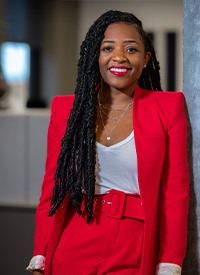by Tashi Copeland
—Communications Officer

Tashi Copeland
Often when people think about philanthropists, their minds immediately go to the big names we’ve seen in the history books and on our newsfeed—Carnegie, Rockefeller, Buffet and Gates. And while the wealthiest people and those deemed to be “top philanthropists” tend to be White, this section of our population is not alone in making generous gifts to impactful causes. When we stray from the traditional portrait of a philanthropist, the term often used is “emerging donor.” And too often, this is code for “the Black donor.”
Let’s break down the word emerging—defined as “newly formed.” But is giving-while-Black a new concept? A 2012 study from the W.K. Kellogg Foundation and Rockefeller Philanthropy Advisors shows that nearly two-thirds of Black households donate to community-based organizations—generating $11 billion each year. So why isn’t this narrative commonplace?
Unfortunately, the narrative at the intersection of philanthropy and Black focuses on melanin-rich individuals as the receivers or the problem to be solved. Not the donors. Not part of the solution. From my experience, the narrative that Black philanthropists are an anomaly has to do with the racial wealth gap. On average, a White household has a typical net worth 10x greater than a Black household. The current and common narrative constantly perpetuates that wealthy and elite people are the only “true philanthropists,” leaving Black people out of the story.
Out of critical conversations.
Out of board rooms.
Out of history.
However, the numbers show that the Black community has always prioritized philanthropy DESPITE the racial wealth gap, systemic racism and discriminatory practices that have historically blocked us from asset-building and wealth creation.
As a kid, I can remember sitting in church every Sunday with one dollar in my small hands, ready to put it in the offering plate. Ready to help my community. Sometimes that dollar went to the church to keep the doors open. But often, these collections were donated to community initiatives—a neighborhood community center or a scholarship fund for the kids getting ready to graduate high school with hopes of attending college. Another problematic misconception is that Black people blindly and exclusively give to religious factions, which a professional advisor may deem not a “strategic use” of our dollars. Until very recently, there have not been options for us to participate in traditional philanthropy because of fee structures or minimum contribution requirements. For so many, our churches were our donor-advised funds. And unrestricted too.
Society must recognize that Black philanthropists will not always be the ones who can make large monetary donations to organizations. So yes, I applaud Beyonce’s BeyGood organization and Lebron’s More Than A Vote. But I also celebrate the Black woman running the food pantry out of her kitchen in Riverside. I celebrate the young Black man giving free haircuts the day before school starts in Haughville. And I celebrate that little girl sitting on the front pew with her feet swinging above the church floor, proudly patting the four quarters in her pocket.
Giving-while-Black may not lead to one’s name being plastered on a building or making an annual Forbes list. However, Black philanthropy is engrained in our nation’s history, supporting and uplifting our community—in times of need and in times of joy. So please do not label us “emerging donors.” While our names may not be in your history books—or in your donor database for that matter—we’ve always been here.






Thank you for helping me and others better understand this important matter.